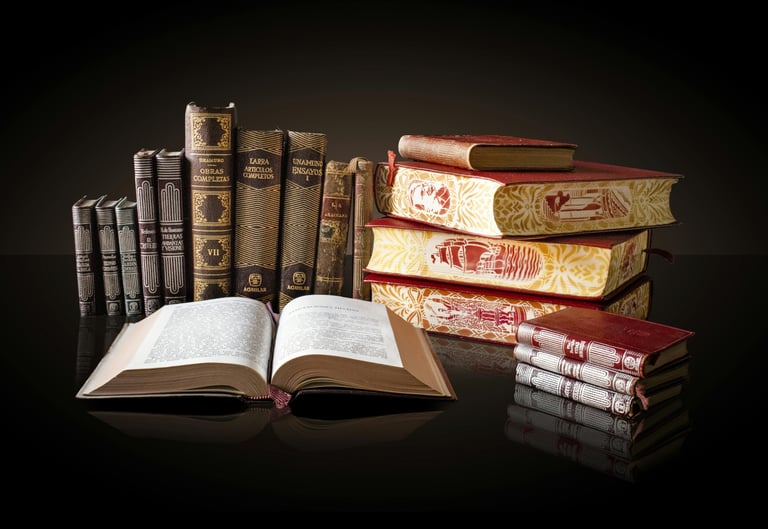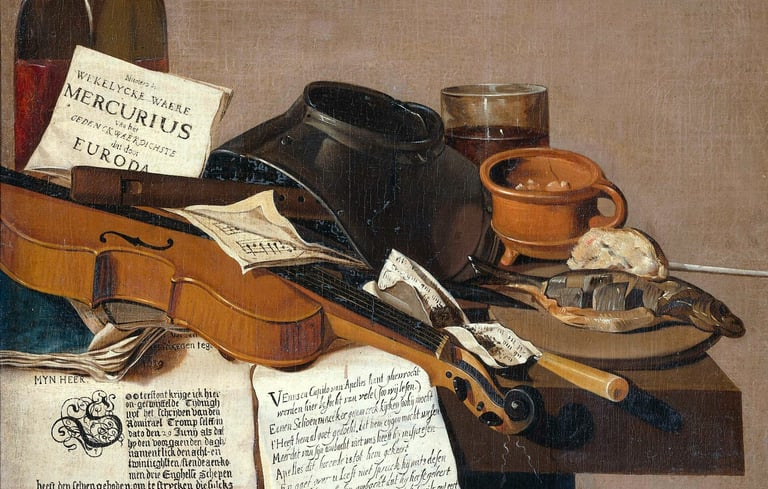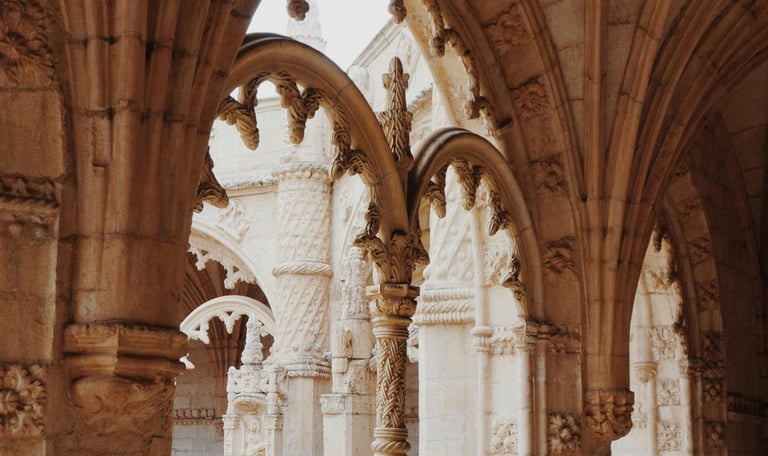
Our Curriculum
What do we hope to offer?
Augustine said: “The love of knowledge and truth should invite us to continue learning. The love of others should compel us to teach.
An Augustinian community is a place where the search for truth takes place in a climate of love and friendship, where one can experience that “truth is neither yours nor mine, so that it can belong to the both of us.” For Augustine, love is the beginning (God’s love in the incarnation), the goal (to love the Lord your God) and the process (the love of God is shed abroad in our hearts by Holy Ghost) of education. We hope to provide a place where our children will learn to know the Love (God Himself), learn in love, and learn to love.
Also Augustine stated: ‘the only way to understand Virgil is to love him.’ We believe without sympathy and enthusiasm, without giving of ourselves, without a debt of love, there can be no knowledge of things that really matter. With this background as our starting point, we began to evaluate our curriculum in light of the Liberal Arts which Augustine had received and renewed, and in light of the long rich history of classical education, seeking a way to map the path that would take our students from uninstructed youth to mature, educated and loving disciples of Christ.
Our analysis helped us define our 11 principal areas of study. They follow below, with explanation.
1. Bible & Literacy
“All scripture is given by inspiration of God, and is profitable for doctrine, for reproof, for correction, for instruction in righteousness.” 2 Tim. 3:16
We believe the Bible has ultimate authority above all subjects, and deserves the prime priority and the most time. The study of all other subjects should be in the light of the holy revelation of God.
Thus, science is not enough for man’s education. The biggest lack in the study of science is that it doesn't provide us with the knowledge of man. Great literature helps us to know both man and things, enriching children`s imagination.
For example, we will include poems from Homer’s epics down to Milton, Eliot, Longfellow, Shakespeare, and Tennyson, novels by Dickens, Chaucer, or Shelley, and philosophers like Socrates, Hume, or Kierkegaard, etc.




2. Natural History & Science
“But ask now the beasts, and they shall teach thee, and the fowl of the air, and they shall tell thee. Or speak to the earth, and it shall teach thee, and the fishes of the sea shall declare unto thee.” Job 12:7-8
The Bible has given us a solid foundation for the study of nature. General revelation in Creation can impart to us the wisdom and greatness of the Lord also.
We hope to lead children to experience the real substance of Creation through all the senses of the body at a young age in wonder, and emphasize the scientific method at an older age in wisdom.
Science is a highly-regarded part of our curriculum. Our culture often worships science as part of its materialistic worldview. We do not regard science as a thing to be worshipped, but as a means of reflecting the glory of God. We relate science to God's order and His greatness.


3. The Language arts
“In the beginning was the Word, and the Word was with God, and the Word was God.” John 1:1
We believe there is a significant link between Word and words. Man is a creature who dwells in words and language. Language defines and represents a certain culture.
Language study by the pathway of the arts of trivium (grammar, logic and rhetoric) will be one of most important parts of our education.


4. The Common arts
“Then wrought Bezaleel and Aholiab, and every wise hearted man, in whom the LORD put wisdom and understanding to know how to work all manner of work for the service of the sanctuary, according to all that the LORD had commanded.” Exod. 36:1
The common arts are the skills that provide for our basic human needs through the production of artifacts or the provision of services.
We believe the common arts play an important role in granting wisdom to children in the same way as the liberal arts intellectually do.
We hope to lead children to explore the common arts in many different areas as a groundwork, such as agriculture, architecture, trade, tailoring and weaving, metalworking, woodworking, navigation, cooking etc.
5. The Fine Arts/ Aesthetics
“Beautiful for situation, the joy of the whole earth, is mount Zion.” Ps. 48:2
Beauty is the radiance of the truth. Aesthetics are not neutral and individually defined, but rather must be consistent with the order and proportion of God’s Creation. True beauty will lead man to it’s source - God Himself.
Is everyone born with a developed appreciation for the truly beautiful? Classical education helps students develop an appreciation for great art. This requires exposure to masterpieces of painting, sculpture, drawing, architecture, and other visual works. It also requires exposure to excellent music.
We will work through hymns, classical music, master painters and study what makes great art great.




6. Latin & Greek
“High thoughts must have high language." Aristophanes
A great part of tradition and meaning is hidden in the form of language. Latin and Greek form the basis for Western culture and language, and even for Christianity (including the Hebrew language).
When studied together with English, students are better spellers, have broader vocabularies, and obtain a more thorough understanding of grammar. The student's grasp of language affects his very depth of thought as he uses precision in his vocabulary to better understand God and His world.
Careful attention to grammar makes the student more skillful in discerning subtle shades of meaning.


7. Logic & Mathematics
“And he reasoned in the synagogue every sabbath, and persuaded the Jews and the Greeks." Acts 18:4
Exercising the mind in logic prepares students for the development of wisdom. Unfortunately, logic is all but forgotten in modern-day schools. Logic and mathematics are embedded in Creation, they were employed by God to design and create the world.
Mathematics leads souls into transcendent thoughts. We hope to teach them as wonders scattered in creation as well as the applied mathematics.
8. History
“I will open my mouth in a parable, I will utter dark sayings of old: which we have heard and known, and our fathers have told us." Ps. 78:2-3
History is HIS story. Christianity is a religion of memory. Erasing history from education is robbing our memory and denying our identity, because Christian history is a record of God’s dealing with man.
We should explain and evaluate man’s deeds in the light of the Bible. The value placed on history is dictated by our worldview.
We hope to employ rich and classical approaches to teach history as stories, reading aloud, using flash cards, singing, studying poems, original texts etc.




9. The Great Conversation
“After much converse... and a life together, suddenly a light, as it were, is kindled in one soul by a flame that leaps to it from another.” - Plato
This great conversation uses the Great Books to formulate and evaluate the ideas that have shaped our culture. In the 1950's, Mortimer Adler and over 40 scholars formalized this study in an attempt to preserve for posterity how students had learned over a period of two millennia.
As the modern educator gradually eliminated the practice of seeking truth in great literature, these scholars recognized this great loss. The practice of investigating, arguing, and grasping the deep concepts of the best thinkers in history plays a vital role in exercising the mind and developing wisdom.
Students may not remember all the books they read, but the development of their minds is inescapable. We will use the Bible as the greatest book to place a worldview lens over all that we study.


10. Virtue
"For the fourfold division of virtue I regard as taken from four forms of love... I should have no hesitation in defining them: that temperance is love giving itself entirely to that which is loved; fortitude is the lover readily bearing all things for the sake of the object loved; justice is love serving only the object loved, and therefore ruling rightly; prudence is love distinguishing with sagacity between what hinders it and what helps it.” - Augustine
In the above quote, Augustine defines virtue as right-ordered love. He renewed the four Greek virtues in the light of Christian love
We adopt the insight of liturgy which is illustrated in the book Desiring the Kingdom. We recognize the important role of Christian worship in the formation of desire which establishes the right order of love in children’s hearts. At the same time, we hope to study Scripture as the primary moral authority, train students in manners, hold students to a "heart" standard rather than a "rule following" standard, and use stories to instill a desire for the right and an abhorrence for the wrong.
In short, we want our students to "Love the Good". “Stories, unlike courses in 'moral reasoning,' give children some specific reference points” said William Bennett. Jesus understood this, and His parables remain to this day as the primary tool for teaching Biblical morality.
More than any other tool, we use the classic Western stories of honesty, compassion, courage, and perseverance to develop a love of the good in children.


11. Gymnastics
"What? know ye not that your body is the temple of the Holy Ghost which is in you, which ye have of God, and ye are not your own? For ye are bought with a price: therefore glorify God in your body, and in your spirit, which are God's." - 1 Cor 6:19-20
We believe human beings are made in God’s image and that we are composite beings - a union of soul and body. The particular part of education called gymnastics, harnesses human’s bodily potential and trains it.
Gymnastics serves intellectual and moral education as well. We hope to offer such course as gymnastics which employs various sports and games to build strength and agility with an emphasis on cardiovascular endurance, and develop a healthy, coordinated body.
We are looking for passionate families and teachers
"The love of knowledge and truth should invite us to continue learning. The love of others should compel us to teach."
~ Augustine of Hippo ~
CONTACT
would you like to receive updates?
Phone or Whatsapp: 07438 474306
© 2025-2026. All rights reserved.




